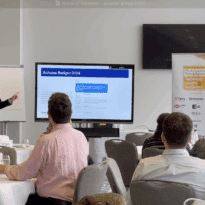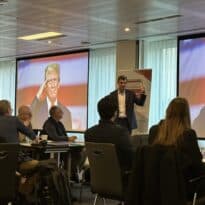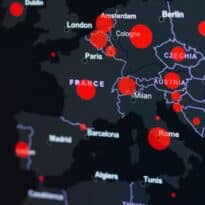In this episode, we explore how European companies are responding to global headwinds, from tariffs and political unrest to slowing demand. Despite headlines often painting a bleak picture, many niche businesses are thriving by tapping into structural growth drivers.
David Walton, manager of the IFSL Marlborough European Special Situations fund, discusses the resilience of smaller and micro-cap companies, highlighting standout performers in luxury jewellery and power tools, and considers how disciplined patience and off-the-beaten-track investing can deliver strong results.
Why you should listen to the interview: If you’re concerned about market hype, overvalued sectors, or simply want to understand how to find genuine opportunities in neglected areas, this interview is for you. It blends practical investing wisdom with real-world stories, equipping listeners with a mindset for navigating uncertainty while uncovering hidden gems.
This interview was recorded on 17 September 2025. Please note, answers are edited and condensed for clarity. To gain a fuller understanding and clearer context, please listen to the full interview.
Interview highlights:
How different companies navigate volatility
“We have a very diverse range of companies in the portfolio, which is one of its strengths. So it means different things for different companies. For the firm’s biggest holding Sarantis, one of their big products is sun cream, and it’s still sunny in Greece. So good news, their sales are currently growing this year because they’re not reliant upon US tariffs, they don’t sell much into the US.
“Other companies we hold such as Fope, which is a luxury jewellery company, has strong growth this year, despite the fact that US customers are perhaps being a bit more cautious, other companies are more mixed.
“So we have a company called ProAct IT Group, which sells hardware and data storage solutions in Europe. They have seen a slowdown as their corporate customers press the pause button as they are concerned about the tariff implications for their business. Others also are slowing down and companies such as R&S Group in Switzerland, which sells transformers, is experiencing continued strong growth because there is a large deficit in the investments in electricity grids in Europe.”
Smaller companies and Europe’s growth potential
“The main thing to say is that there’s a big difference between the fairly slow rate of economic growth in Europe, which we expect will continue, and the rather fast direct growth that can be achieved by certain smaller companies which are based in Europe.
“I gave the example of R&S Group in Switzerland, which is selling transformers to the electricity grid, which is experiencing double digit growth because it is in a sector or even a sub-sector, which has got particular strong growth drivers. We are trying to seek out those companies which are in certain sub-sectors where there are different growth drivers compared to the wider European economies, which are slow growth economies and we’re not expecting that to change. And certainly the success we’ve had with the funds over a longer period of time has been down to certain investments in companies which have materially outgrown the European economies despite being based in Europe.”
Finding under-appreciated opportunities
“As well as doing our own analysis, building our own financial models, documenting company acquisitions, et cetera, we also meet the companies to get an impression of the managements, the people who are running the company. For example, we hold the Italian luxury jewellery company Fope, which is a pretty small company, but we’ve met the company a number of times, also visited their shop as well.
“So it is just getting the basics right, meet the company, understand its business model, what it does and see the company in action, if it’s a retailer for example. These are all just very basic things which we have to do. It’s more to identify any weaknesses in the company, which we perhaps weren’t aware of just from looking at their presentation material.”
Risks, opportunities, and long-term outlook
“Our job is to identify undervalued growth companies and then to be reasonably patient and hold them and give them time to develop their businesses and get a rewriting of their share prices. So that’s really what our job is. And I think the conditions are quite good for that because the headlines around Europe are often negative. This creates opportunity to buy some of these companies at fairly attractive share prices.
“We’re quite busy researching new ideas at the moment. And then certainly the actual equity market itself, I think we’ve had any number of geopolitical shocks, which have depressed the European equity markets over the last really five years, going back to 2020, even before that, in 2018 we had a slowdown. So there have been a number of setbacks recently. Also, obviously the tariff issue is the latest shock. So, on a simplistic level, if there were fewer of these shocks, then that in itself would be a positive. It doesn’t have to be an amazingly positive development, it just has to be a lack of these quite negative shocks.”
Conclusion: This conversation highlights the power of patience, discipline, and independent thinking in global equity investing. By avoiding the herd and seeking value where others aren’t looking, long-term wealth compounding becomes possible, even in volatile markets.
Main image: christian-lue-7dEyTJ7-8os-unsplash
































